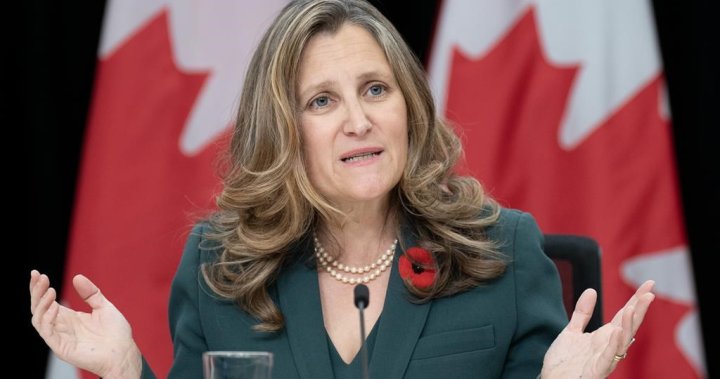Deputy Prime Minister Chrystia Freeland has rejected the idea of the Liberal caucus holding a secret ballot vote on Justin Trudeau’s leadership, stating that it is not how Liberals govern themselves. Last week, 24 members of the caucus signed a letter calling for Trudeau to step down, but he firmly stated that he will lead the party into the next election. Some dissenters are now calling for a secret ballot vote among Liberal MPs to determine if Trudeau should remain leader. However, Freeland emphasized that leaders are not chosen by secret ballot in the Liberal party as per their rules.
After the previous election, parties had the opportunity to decide if they would implement measures outlined in the Reform Act, which allows MPs to force a leadership review. The Conservatives opted in and used these measures to oust former leader Erin O’Toole in 2022. The Liberals did not opt in, leaving them without a mechanism to depose Trudeau even if the majority of MPs desired his removal. Some Liberal MPs, such as Sean Casey, wish for a mechanism for a leadership review, as they believe there are members motivated by factors other than their constituents’ views. A secret ballot vote could provide accountability to constituents and bring finality to the issue.
Trudeau’s leadership has been questioned as the Liberals continue to lag behind the Conservatives in public opinion polls. The Liberal caucus is scheduled to convene for a meeting following the previous three-hour session, during which several MPs indicated to Trudeau that they believe he should step down for the party’s sake. If a secret ballot vote were allowed, it would resolve the question of Trudeau’s leadership regardless of the outcome, according to Casey. This would enable the party to move past internal disputes and focus on critical national issues in preparation for the upcoming election.
Several cabinet ministers voiced their support for Trudeau and advised other elected Liberals to express their concerns within caucus meetings rather than publicly. Employment Minister Randy Boissonnault emphasized that if MPs wished to speak out within the Liberal caucus, they should do so openly. The debate surrounding Trudeau’s leadership and the call for a secret ballot vote highlight tensions within the Liberal party and the desire for clarity and resolution. The focus on internal party matters has drawn attention away from pressing national issues, prompting calls for a decision on Trudeau’s leadership to allow the party to move forward.
In the absence of a mechanism for a leadership review, Liberal MPs who signed the letter calling for Trudeau’s resignation are left without a clear path to effect change. The refusal to allow a secret ballot vote raises questions about the party’s internal governance and decision-making processes. Freeland’s assertion that the Liberal party does not choose leaders through secret ballots underscores the party’s commitment to its established rules and traditions. The ongoing debate and uncertainty surrounding Trudeau’s leadership underscore the challenges and divisions within the Liberal party as it prepares for the upcoming election and deals with pressing national issues.


